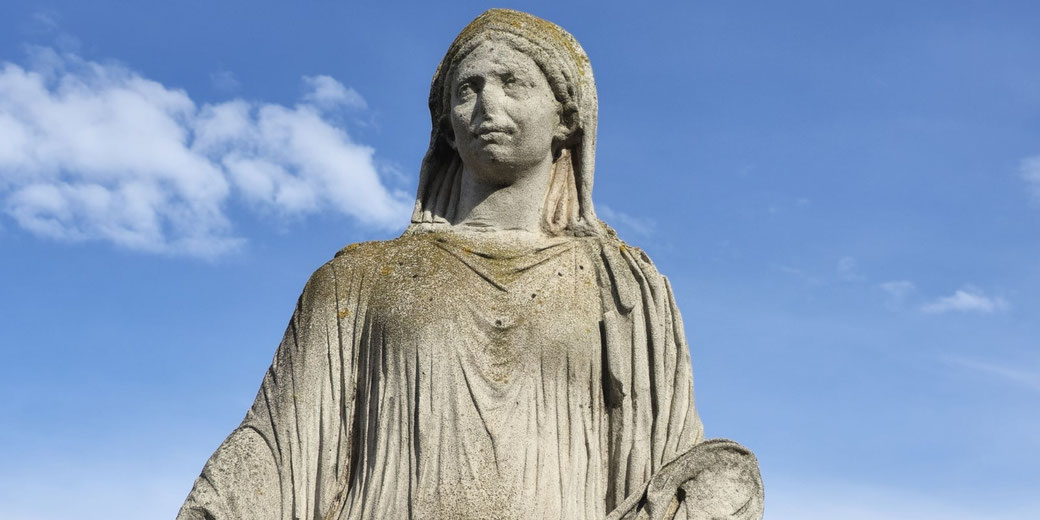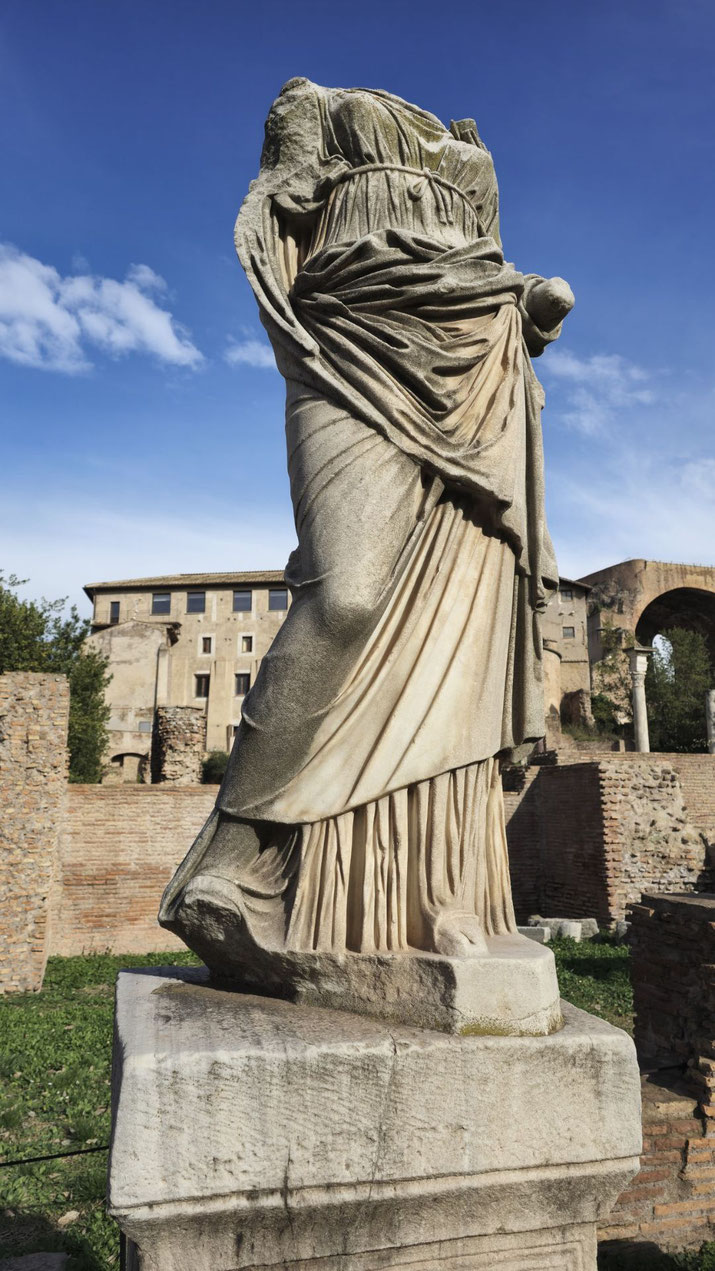The Bona Dea Scandal: How a women's only event almost destroyed Julius Caesar's political career

In 62 BC, a private religious festival held at the home of Julius Caesar caused a public scandal that placed his career at risk.
As Pontifex Maximus, Caesar had the duty to keep the religious ceremonies of Rome, and a nobleman’s entry without permission into this sacred women-only ceremony upset an important religious custom.
What was the Bona Dea Festival?
The Romans honoured Bona Dea as a goddess responsible for fertility and chastity, and they believed she could heal the faithful.
Her true name stayed a secret known only to her priestesses, and her worship was strictly limited to women.
Male participation in her rites was forbidden, and even knowledge of the ceremonies was considered inappropriate for men.
The ceremonies for her included prayers, sacrifices, and musical performances, although the Roman women did not reveal the specific practices.
During December, a private ceremony took place in the home of a senior magistrate or priest, which in 62 BC meant formal residence of the Pontifex Maximus.
Julius Caesar had recently been appointed to the role and had given responsibility for hosting the festival to his wife, Pompeia.
The household removed every man before the rituals began, including the servants.
Household members cleansed the rooms and draped garlands on altars. Once the women arrived, they began to carry out the ceremonies.
The Vestal Virgins, though important figures in Roman religion, did not participate in the Bona Dea ceremony.
The secrecy of the event formed part of its holy nature, and any disruption posed a risk to Rome’s religious order.
Romans considered correct performance of these ceremonies to be essential, especially when the state security rested on the gods’ goodwill.
For the public, a man’s intrusion into such a space meant that the traditional boundaries between male and female spheres had been ignored and that the gods’ established order had been disrespected.

The key figures of the scandal
Publius Clodius Pulcher was already infamous for his rash actions and his desire to win support from the crowd and became the main offender in the following events.
His decision to disguise himself and enter the Bona Dea festival appeared to be designed to cause outrage.
Some claimed that he pursued Pompeia and entered the house to continue a secret affair.
Others believed that he acted out of pride and a desire to mock sacred customs.
Whatever his intention, his actions set off a political uproar.
Julius Caesar found himself in an awkward position. As Rome’s chief priest, he had full responsibility for protecting Rome’s relationship with the gods.
He did not attend the ceremony and may not have known of Clodius’s plan, but the unauthorised entry happened in his home, and the city expected him to answer for it.
His public role required personal integrity and household discipline. Once that discipline appeared compromised, critics took the chance to attack his authority.
Pompeia, who held the role of hostess and religious sponsor, came under immediate suspicion.
Though no formal evidence linked her to Clodius’s plan, rumours circulated that she had enabled his entry.
In a society that viewed a woman's virtue as central to her family's reputation, such gossip proved difficult to silence.
Her position as Caesar’s wife and as the person in charge of the religious space drew close examination that weakened both her public standing and Caesar’s credibility.
Finally, Cicero, a senior statesman and former consul, was part of the affair through his testimony against Clodius during the later trial.
He even mocked Clodius in court by saying that his voice had betrayed his disguise.
His public attack on Clodius focused on the moral violation and the political danger that such behaviour caused.
The two men already disliked each other, and Cicero’s involvement increased their personal rivalry.
How the scandal unfolded
On the night of the festival, Clodius entered the house dressed as a woman and claimed to be a musician or servant.
His disguise allowed him to slip inside undetected for a brief period. Eventually, a member of the household heard his voice or recognised his mannerisms, and he was discovered hiding in a corner of the house.
Panic spread among the participants, and the rites stopped immediately.
The following morning, news of the incident reached the Senate. Religious officials called for a formal investigation, and the Senate condemned the intrusion as a sacrilegious act.
Because the Bona Dea ceremony concerned the well-being of the entire state, the matter could not be dismissed as a private embarrassment.
Public anger rose quickly, and pressure mounted for legal action.
Clodius faced formal charges of violation of religious rites under the provisions of the Lex Papia law, a law that had been specifically designed to punish violations of sacred rites.
The trial became an arena for political rivals. Witnesses came forward with conflicting stories, and the jury, composed mostly of members of the equestrian order, faced heavy pressure.
Clodius used his wealth and connections to pay off jurors and threaten his opponents.
His allies framed the charge as a political attack by the conservative senators, while his enemies portrayed him as a threat to public morality.
Caesar did not openly back or defend Clodius, but divorced Pompeia after the trial began.
Although she had not been formally implicated, Caesar stated that his wife must be "above suspicion."
His divorce removed the main topic of gossip and allowed him to separate himself from further scandal, but it also drew criticism for failing to protect his household and for making political calculations at his wife’s expense.

The legal and political ramifications
The trial of Clodius ended in a not guilty verdict, yet most Romans believed that the verdict had been bought.
The case exposed the weakness of Rome’s court system, where the rich could manipulate juries and escape punishment.
Public confidence in the courts declined, and political commentators used the event to demand reforms to the legal process.
For Clodius, the outcome preserved his career and enhanced his image as a man who challenged traditional elites.
He soon sought election as tribune of the plebs, where he gained legal power to propose reforms and target his enemies.
After formally renouncing his patrician status in 59 BC to become eligible, he won election, which boosted his popularity.
The scandal, instead of ending his career, gave him greater fame and helped him win popular support.
His vendetta against Cicero eventually led to the orator’s exile.
For Caesar, the scandal proved more damaging in the short term. It forced him to defend his position as Pontifex Maximus and to reassure his allies that he remained fit for leadership.
His rivals used the event to raise doubts about his ability to maintain religious purity and household order.
Although he recovered his reputation and advanced his career, securing the consulship in 59 BC, the Bona Dea incident became a lasting blemish on his early record.
Political discourse in the Senate also became more aggressive. The division between the popular leaders and optimates grew sharper, with Clodius and Caesar increasingly viewed as part of a populist movement that undermined traditional Roman values.
The scandal contributed to the uncertainty and strain in the final decades of the Republic, much like later controversies involving prominent figures such as Mark Antony.
The religious implications for women in Rome
Roman women occupied a limited space in public life, but religious rites offered one of the few areas where they exercised leadership.
The Bona Dea festival stood out as a moment where women held full control of sacred rituals.
After the scandal, many Romans questioned how a man could have entered such a protected space.
The failure to prevent the breach damaged trust in women’s ability to manage their religious duties.
Critics called for tighter supervision and stricter controls on female-led rites.
Some even suggested that such secretive events invited misconduct and should be abolished or reformed.
In other cases of sacrilege, Vestal Virgins had been called to give testimony or intervene, yet none were involved here, perhaps showing the gender aspects of the scandal.
For the women of Rome, the scandal was a reminder of the uncertain boundaries of their public influence.
Although they had done nothing to provoke the intrusion, they became the focus of suspicion, and reminded the political class that women’s visibility in religious life remained dependent on male approval.
It also showed how quickly a public incident could lead to personal ruin for women in high-status families.
What do you need help with?
Download ready-to-use digital learning resources
Copyright © History Skills 2014-2025.
Contact via email
With the exception of links to external sites, some historical sources and extracts from specific publications, all content on this website is copyrighted by History Skills. This content may not be copied, republished or redistributed without written permission from the website creator. Please use the Contact page to obtain relevant permission.





